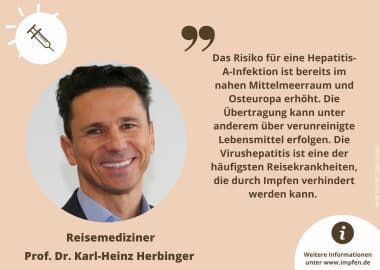Vaccination certificate check is part of every good holiday planning
A holiday trip should be carefully planned, especially during the pandemic. In addition to the corona protection measures, it is also important to think about protection against other diseases. A timely check of vaccination protection should be part of every travel preparation. This is because even in other European countries, especially on the Mediterranean and in Eastern Europe, there is a risk of becoming infected with viruses such as the hepatitis A virus, for example.
Lack of hygiene also common reason for infection in Europe
Many people want only one thing at the moment: to enjoy their free time and relax on their summer vacation. To ensure that this works and that you don’t experience any nasty surprises, especially after your holiday, protection against hepatitis is important. In Germany a large proportion of newly diagnosed hepatitis A infections are an unwanted travel souvenir. The highly contagious hepatitis A is therefore also referred to as “traveler’s hepatitis”. In popular European countries, such as the Mediterranean or Eastern Europe, the risk is particularly high. With low hygienic standards, the risk of infection increases, for example through contaminated water. Hepatitis A is transmitted through contact or smear infection, mainly via contaminated food. This includes the consumption of raw fish and seafood (e.g. mussels, shellfish, oysters), but fruit and vegetables or ice cubes in drinks can also cause infection. [1]
Hepatitis A outbreaks in the Mediterranean region show the importance of protection
 The danger is not always visible to travelers. There are often several weeks between infection and the first symptoms, so that the possible route of infection can no longer be reconstructed. If the disease breaks out, it can lead to non-specific gastrointestinal symptoms and a general feeling of illness. Current hepatitis A outbreaks underline the importance of vaccination. In 2018, 39 travel returnees were infected in Morocco with hepatitis A, the source of transmission was contaminated dates. [2] Persons travelling to corresponding risk areas should therefore have sufficient vaccination protection. [3] There have been well-tolerated and effective vaccinations against hepatitis A and B for decades. For those who decide at short notice, the vaccination against hepatitis A can be administered shortly before the trip. In addition to comprehensive vaccination protection, some nutritional advice is also helpful. In principle, ice cubes should be avoided in drinks, tap water should only be used boiled and industrially sealed containers should be used for drinks. Raw fish and undercooked meat should also not be on the menu. So the rule is: peel food, cook it, or do without it completely. [4]
The danger is not always visible to travelers. There are often several weeks between infection and the first symptoms, so that the possible route of infection can no longer be reconstructed. If the disease breaks out, it can lead to non-specific gastrointestinal symptoms and a general feeling of illness. Current hepatitis A outbreaks underline the importance of vaccination. In 2018, 39 travel returnees were infected in Morocco with hepatitis A, the source of transmission was contaminated dates. [2] Persons travelling to corresponding risk areas should therefore have sufficient vaccination protection. [3] There have been well-tolerated and effective vaccinations against hepatitis A and B for decades. For those who decide at short notice, the vaccination against hepatitis A can be administered shortly before the trip. In addition to comprehensive vaccination protection, some nutritional advice is also helpful. In principle, ice cubes should be avoided in drinks, tap water should only be used boiled and industrially sealed containers should be used for drinks. Raw fish and undercooked meat should also not be on the menu. So the rule is: peel food, cook it, or do without it completely. [4]
To prepare: Vaccination passport check with family doctors
In order to be adequately protected, travellers should have their vaccination status checked early (4-8 weeks before travel) in order to have the standard vaccinations Covid booster, tetanus, diphtheria, pertussis, influenza and also hepatitis refreshed if necessary. The vaccination certificate check is offered by all family doctors. Useful information for health holiday planning and all important travel vaccinations can be found on the website www.bereit-zu-reisen.de.
About GSK
We are a global research-based healthcare company with a mission to help people live more active, longer and healthier lives. For more information, please visit www.de.gsk.com.
Learn more about travel health on www.bereit-zu-reisen.de.
[1] RKI “Ratgeber Hepatitis A”. Available at: https://bit.ly/3bXlF8G. February 2022.
[2] RKI Epidemiological Bulletin 06/2019. Available at https://bit.ly/3oFLWhg. February 2022.
[3] RKI FAQ Vaccination Protection Hepatitis A Available at: https://bit.ly/3L3O500. February 2022.
[4] RKI “Ratgeber Hepatitis A”. Available at: https://bit.ly/3bXlF8G. February 2022.


